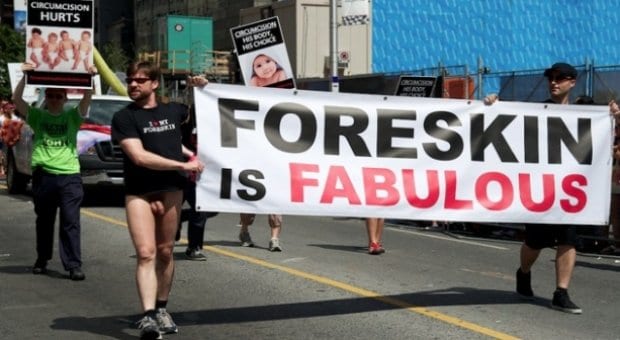Glen Callender is not, as he puts it, “an authority-flouting naked rebel.”
He’s more of an opportunistic nudist who marches pantsless in Pride parades that’ll have him to draw attention to what he considers the injustice of circumcision, a topic dear to his . . . heart.
Earlier this year, and last, he marched unfettered in Toronto’s Pride parade, without incident.
Last August he did the same here, also without incident, or so it seemed. Until the Vancouver Pride Society (VPS) suddenly rejected Callender and his Foreskin Pride group’s application to march again this year.
Callender tells me the VPS hedged when he first questioned the rejection. His first call, he says, was met with a tepid, rote answer about there not being enough space for all applicants to march in the parade. Skeptical, he demanded a written explanation.
“Ray Lam then sent an email confirming that we were refused and stated that we were excluded because of last year’s nudity,” Callender says. “He did not mention space concerns at all.”
When Xtra called the VPS manager, Lam initially distanced himself from any crackdown on nudity. Instead, he pointed to parade capacity and the difficulty of accepting all 200-plus applicants.
“I want to be clear,” he says. “The foreskin awareness group was not turned away because of nudity.”
But it doesn’t take long for Lam to reveal his true reason for banning Foreskin Pride.
“We have to follow the law, and it’s clearly stated in the law that you can’t be nude in public,” he says. “That is not something that has to do with Vancouver Pride. That’s not our rules and regulations. We have to follow the law.”
Really? Since when?
It’s not as if Callender’s nudity hurt anybody. And it’s not as if the police or the city care. Both deny putting any pressure on Pride to crack down on nudity, despite this year’s shiny new civic designation.
“No, no, no,” says spokesperson Viviana Zonocco, when asked if the city is leaning from the sidelines. “I’ve spoken with city staff and the streets department who handle the parade, and no, not at all.”
“I think the Vancouver Police Department are really cool about stuff like that,” she adds.
Then to whom can we attribute this sudden burst of controlling squeamishness? The VPS’s board of directors? Lam, the man who led the VPS’s restructuring to create the manager position that he now fills?
What’s next? Will the Dykes on Bikes be told to put their shirts back on?
Previous VPS boards have respected the importance of self-expression and unabashed celebration.
“We were always advised by the city that the parade was a family-friendly event and that we should never encourage nudity,” says past president John Boychuk. “But there was no way of stopping it, of course. How do you tell someone who’s been marching in the parade for 35 years that they can’t express themselves?”
And why would you want to?
Though Callender would be just as happy to march his anti-circumcision message down Denman Street fully clothed, he is “deeply concerned at the prospect of the VPS cracking down on nudity when the city and police have indicated they are willing to tolerate it.”
“If the VPS’s tolerance of harmless public nudity at Pride is now to the right of the city and the police, then our community has a problem,” he says.
I couldn’t agree more.
Why is the Pride Society trying to feed us a watered-down version of our own celebration? Self-censorship in the name of someone else’s need to seem “presentable” doesn’t make me want to cheer.
Robin Perelle is the managing editor of Xtra Vancouver.

 Why you can trust Xtra
Why you can trust Xtra


